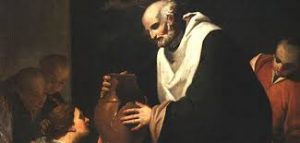HOMILY ADVENT DECEMBER 23 – Year I
An Infinite Horizon of Faith, Forgiveness and Healing:
Optional Memorial of St. John Kanty
(Mal 3:1-4; 4:5-6; Ps 25; Lk 1:57-66)
********************************************************
Bishop Olivier Tremblay, an Oblate who previously worked with university students in Eastern Canada, spoke at an Oblate symposium once. He noted that youth today lack hope, because they don’t have an infinite horizon of faith into which they can situate the events of their lives. They are at the mercy of what happens to them any particular day, and if that is too painful, like a break-up of a relationship, they may even take their own lives. In fact, that precise scenario has been brought to my attention twice recently, as parents had to face a crisis of suicidal teenage children because relationships were terminated.
Today’s readings offer us an infinite horizon of the possibility of renewed relationships through faith, forgiveness and healing.
Our faith, according to Malachi, is in the one who “comes suddenly to his temple,” the “messenger of the covenant in whom we delight,” the one who will refine us. According to the psalm, it is in a “good and upright Lord” who redeems, teaches, guides and is steadfast love. And we know according to John the Baptist, our faith is in Jesus who is all these things, plus the Lamb of God who takes away the sins of the world, who will baptize with the Holy Spirit. As Archbishop Emeritus Adam Exner OMI teaches, our faith is in Jesus who came as the Messiah with a two-fold mission: to redeem and to sanctify; to forgive and to heal. That is our infinite horizon of faith filling us with hope for transformation.
That transformation involves relationships. Spirituality is all about relationships and connectedness. As human beings in this world, we operate on four levels of relationships: with God, others, ourselves and all of God’s creation.
It begins with a covenant relationship with God, who consistently desires an intimate covenant relationship with God’s people, beginning with a couple, Adam and Eve, then a family, Noah, then a tribe, Abraham, then a nation, Moses. With David, it became a covenant of unconditional love, and with Jesus, it culminates in a humble covenant of mercy, forgiveness, compassion, unconditional love and total non-violence, sealed in the sacrifice of his body and blood.
Malachi speaks of one who is like a refiner’s fire and fuller’s soap, who will purify and refine the Israelites into holiness and righteousness. This connects with the two-fold mission of the Messiah – to redeem and sanctify, to forgive our sins and heal us of our sinfulness, to “purify” and to “refine”. He refers to the return of Elijah, whom we know was John the Baptist, who would turn the hearts of parents to their children, and vice versa. And we know John the Baptist in turn spoke of Jesus who would baptize with power and the Holy Spirit, who would take away sin, unlike his baptism with water that could only point out sin and call to repentance.
It is only Jesus who can truly redeem and sanctify us. Redemption comes to us, as the psalmist proclaims, when we repent, confess and come to him to receive his forgiveness for our sinful actions. But there is more. Sanctification comes to us when we pray for healing of our sinfulness (that which made us sin). That healing is what truly transforms us into Christlikeness and helps us walk in God’s ways and paths.
As an example, Bob took seriously a retreat director’s suggestion to look at the pattern of his sins, and find the main one. What he found, after some painful prayerful reflection, was he did not really trust in the providence of God to be there and care for him in the end. As a result, he had accumulated and surrounded himself with material comforts and all the latest gadgets. Now he realized he had to start divesting himself of these items as a sign of his deeper awareness and growing faith in God.
To my mind, and in the light of steps 4 – 9 of the 12 Step Program, what Bob did was discover his core defect of character or sinfulness (that which makes us sin) – lack of trust, and his resultant sin or wrong-doing – spending money on superfluous material things. This was his Advent “going into the desert” of his shadow side, conversion and coming out a better person.
A final element Malachi brings out is the healing of relationships – hearts of parents and children turned to each other. There is as great a need for that now as ever, with so many families struggling with dysfunction and woundedness, and people finding it so challenging to get along in the workplace.

St John of Kanti
Today the church invites us to honor a little-known saint, St. John of Kanti. John was born in Kanti, Poland, in 1390. After his ordination, he served in the Faculty of Theology at Krakow University. A popular teacher and preacher, John was noted for his simplicity and love for the poor. He died in 1473 as was canonized in 1767.
The Eucharist offers us an opportunity to give thanks to God for the gift of his Son Jesus by offering him back the same gift that he gave to us – the one who redeems and sanctifies, forgives and heals, who makes us whole.
May our celebration today strengthen our faith in Jesus as redeemer and healer, renew our relationships at all levels, and provide us with that infinite horizon of faith and hope that empowers us to love as he has loved us.



